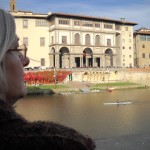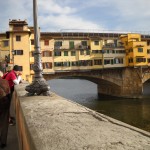The Italian Language
 My friend, Celina Long, is of Italian descent. She speaks the language and embodies the culture. In explaining the language to me, she sent an excerpt from Elizabeth Gilbert’s, Eat, Pray, Love. Although Gilbert’s theology is far afield, nevertheless, her intelligent appreciation of the Italian language is sensitive and insightful. She says, “A sad-faced Russian woman tells us she’s treating herself to Italian lessons because ‘I think I deserve something beautiful.’ The German engineer says, ‘I want Italian because I love the dolce vita’—the sweet life.
My friend, Celina Long, is of Italian descent. She speaks the language and embodies the culture. In explaining the language to me, she sent an excerpt from Elizabeth Gilbert’s, Eat, Pray, Love. Although Gilbert’s theology is far afield, nevertheless, her intelligent appreciation of the Italian language is sensitive and insightful. She says, “A sad-faced Russian woman tells us she’s treating herself to Italian lessons because ‘I think I deserve something beautiful.’ The German engineer says, ‘I want Italian because I love the dolce vita’—the sweet life.
Gilbert goes on to describe why Italian is the most beautiful language in the world. A statement in which we, also, acknowledge to be an accurate bias. She says, “To understand why this is, you have to first understand that Europe was itself once a pandemonium of numberless Latin derived dialects that gradually, over the centuries, morphed into a few separate languages—French, Portuguese, Spanish, Italian. What happened in France, Portugal, and Spain was organic…the language of the most prominent city became the accepted language of the whole region. Therefore, what we today call French is really a version of medieval Parisian. Portugal is really Lisbon. Spanish is essentially Madrileno…The strongest city ultimately determined the language of the whole country. Italy was different.
One critical difference is that Italy wasn’t even a country. It didn’t get unified until quite late (1861) and until then was a peninsula of warring city-states dominated by princes or powers…All this internal division meant that Italy never properly coalesced, and Italian didn’t either….A scientist in Florence could barely communicate with a poet in Sicily or a merchant in Venice (except in Latin, of course, which was hardly considered the national language). In the sixteenth century, some Italian intellectuals got together and decided that this was absurd. …So this gathering of intellectuals proceeded to do something unprecedented in the history of Europe:they handpicked the most beautiful of all the local dialects and crowned it Italian. I
In order to find the most beautiful dialect ever spoken in Italy, they had to reach back in time two-hundred years to fourteenth-century Florence…[This was] the personal language of the Florentine poet Dante Alghieri. When Dante published his, Divine Comedy back in 1321, detailing a visionary progression through Hell and Heaven…he’d shock the literary world by not writing in Latin…. Instead, Dante turned back to the streets, picking up the real Florentine language spoken by the residents of his city (who included such luminous contemporaries as Boccaccio and Petrarch)…He wrote his masterpiece in what he called il dolce stil nuovo, the sweet new style, of the vernacular, and he shaped the vernacular even as he was writing it…as Shakepeare would one day affect Elizabethan English. For a group of nationalist intellectuals much later in history to have sat down and decided that Dante’s Italian would now be the official language of Italy would be very much as if a group of Oxford dons had sat down one day in the early nineteenth century and decided that—from this point forward—everybody in England was going to speak pure Shakespeare. And it actually worked!
The Italian we speak today, therefore, is not Roman or Venetian, nor even really entirely Florentine. Essentially it is Dantean. No other European language has had such pedigree. And perhaps no language was ever more perfectly ordained to express human emotions than this fourteenth-century Florentine Italian…Dante wrote his Divine Comedy in terza rima, triple rhyme, a chain of rhymes with each rhyme repeating three times every five lines, giving his pretty Florentine vernacular what scholars call “a cascading rhythm‖a rhythm which still lives in the tumbling, poetic cadences spoken by Italian cab drivers, and butchers, and government administrators even today. The last line of the Divine Comedy, in which Dante is faced with a vision of God himself, is a sentiment that is still understood by anyone familiar with so-called, modern Italian. Dante writes that God is not merely a blinding vision of glorious light , but that he is, most of all, l’amor che move il sole e l’atre stelle…’The love that moves the sun and the other stars.’ So it’s really no wonder that I want so desperately to learn this language†(Quote finished from Eat, Pray, Love, by Elizabeth Gilbert, pp. 44-46).
One Night in Florence, Italy
We arrived at the Florence train station, Firenze Rifredi, towards evening on October 30th. We soon found ourselves in the company of Italian speaking educators and artists. As the night descended upon us, we roved the piazza near the Duomo en route to a small and quaint ristaurante. It was a chilly evening. The town was getting quiet. But, before we entered the establishment, Dr. Shackleford took us just doors down from the ristaurante, and directed us to look up into the old timbers of an Italian casa, and said–“This is the home of Dante Alighieri.†We reflected in the darkness about where we were; and then we went to eat, where our company ordered the wild boar.
We recall this moment as an example of our Italian experience.